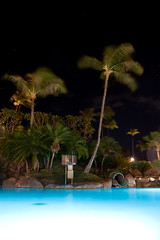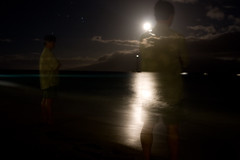I didn’t exactly grew up with what you call “outdoorsy” upbringing, didn’t take my first camping trip until the year I graduated from high school. But I’ve always associated the outdoor with a sense of romanticism. The source of this feeling was probably developed through the books I was reading as a young boy.
Growing up, I dreamed of being a fisherman, ala Hemingway’s The Old Man & the Sea. There’s something undeniably adventurous (at least through the colorful description in the books) about battling the elements of the sea and the simplicity of living off nature. The 3 days I spent in the south China sea escaping Vietnam as a kid probably further enforced the idea. It’s funny because of course, had I followed that dream, I’d be starving everyday since I get sea sick & puke every time I step on a boat. 🙂
I admired folks with deep passion for the outdoors like John Muir, Edward Weston & Ansel Adams. I often imagine the thoughts that were running through John Muir’s head when seeing the pristine western wilderness for the first time.
Then there are extreme folks like Chris McCandless who desperately seek solitude and pit themselves against mother nature, without an ounce of fear. I started to look into McCandless’ life after watching movie Into The Wild. I got curious after I realized when I was watching the credits that the movie was based on real life. (Spoiler-alert: rest of this post discusses the endings at lengths).
 McCandless was from a middle class family in suburban Washington DC. It was clear even at an early age that Chris marched to a different drummer. He was compassionate, intelligent, independent & adventurous. He also had an unusual strong will. To escape a troubled family life, Chris turned to writings of Thoreau, Tolstoy and the likes. He quickly subscribed to the doctrine of asceticism: extreme self-denial as a means to salvation. These writings turned Chris from an innocent young man into an extremely idealistic skeptic. He began to “feel extremely uncomfortable with society.”
McCandless was from a middle class family in suburban Washington DC. It was clear even at an early age that Chris marched to a different drummer. He was compassionate, intelligent, independent & adventurous. He also had an unusual strong will. To escape a troubled family life, Chris turned to writings of Thoreau, Tolstoy and the likes. He quickly subscribed to the doctrine of asceticism: extreme self-denial as a means to salvation. These writings turned Chris from an innocent young man into an extremely idealistic skeptic. He began to “feel extremely uncomfortable with society.”
After college, rather than attending law school per his parents’ wishes, Chris rebelled. He donated all the money in his estate and was determined to invent a new life for himself. He permanently severed all family ties and created for himself a new identity: “Alexander Supertramp.” He burned all his cash, left behind identification documents and drove off in an old Datsun, embarking on a spiritual pilgrimage to seek solitude and to “kill the false being within.”
He wandered the west for almost 2 years before beginning the audacious trek into the frontiers of Alaska in spring of ’92. Determined to live off the land, Chris brought minimal rations. Frankly, he was ill-prepared. He proved very resourceful at first, able to supplement his 10 lbs of rice with hunting and gathering. He sleeps in an old abandoned bus and keeps a journal for 189 days.
By summer however, food was getting low and Chris resorted to eating roots and seeds. Chris eventually succumbed to starvation one August summer day; he was 24 years old and weighed all of 67 lbs. Both the movie and the book suggest toxins did Chris in but that theory had been debunked. Chris left the world with a self portrait snapshot (2nd picture below) the following last message:
“I have had a happy life and thank the lord. Good bye and may god bless all!”.
 It’s ludicrous to suggest Chris was suicidal. Some dismissed Chris as a foolhardy misfit, a nature greenhorn who is no match for the Alaskan wilderness. And some even questioned his mental stability. On the other hand, some people made him out to be a hero; in fact his story is quickly reaching a level of folklore.
It’s ludicrous to suggest Chris was suicidal. Some dismissed Chris as a foolhardy misfit, a nature greenhorn who is no match for the Alaskan wilderness. And some even questioned his mental stability. On the other hand, some people made him out to be a hero; in fact his story is quickly reaching a level of folklore.
I’d argue that “Supertramp” was a lost soul. Every answer he thought he had spawns even more questions. The existential struggles within him lead the young man in search of the pure meaning of his own life and his relationship to the world. His last message and picture seemed to suggest that he was at peace or at least content. There was no indication that he regretted any of his actions.
In the end, that’s what made his journey admirable and worthy of our attention. It is one thing to subscribe to a set of ideals, it’s another to gather the courage to practice them in real life, especially ideas most consider extreme. Chris lived his life by his ideals and died clinging onto them. The wilderness may have defeated him, but there’s no denying that his journey self-discovery was extremely courageous– the type of courage is all but rare this day and age. We can only speculate and theorize if Chris really managed to kill his “false self” within and found what he was looking for.
As for his family, they have my sympathy. His father said that it’s ironic how a compassionate person can create so much pain for close ones. Perhaps they found comfort in one of last Chris’s entries in his journal:
“Happiness is only real when it is shared.”
 McCandless was from a middle class family in suburban Washington DC. It was clear even at an early age that Chris marched to a different drummer. He was compassionate, intelligent, independent & adventurous. He also had an unusual strong will. To escape a troubled family life, Chris turned to writings of Thoreau, Tolstoy and the likes. He quickly subscribed to the doctrine of asceticism: extreme self-denial as a means to salvation. These writings turned Chris from an innocent young man into an extremely idealistic skeptic. He began to “feel extremely uncomfortable with society.”
McCandless was from a middle class family in suburban Washington DC. It was clear even at an early age that Chris marched to a different drummer. He was compassionate, intelligent, independent & adventurous. He also had an unusual strong will. To escape a troubled family life, Chris turned to writings of Thoreau, Tolstoy and the likes. He quickly subscribed to the doctrine of asceticism: extreme self-denial as a means to salvation. These writings turned Chris from an innocent young man into an extremely idealistic skeptic. He began to “feel extremely uncomfortable with society.” It’s ludicrous to suggest Chris was suicidal. Some dismissed Chris as a foolhardy misfit, a nature greenhorn who is no match for the Alaskan wilderness. And some even questioned his
It’s ludicrous to suggest Chris was suicidal. Some dismissed Chris as a foolhardy misfit, a nature greenhorn who is no match for the Alaskan wilderness. And some even questioned his 









 Funny… but it says it all, doesn’t it? 🙂
Funny… but it says it all, doesn’t it? 🙂